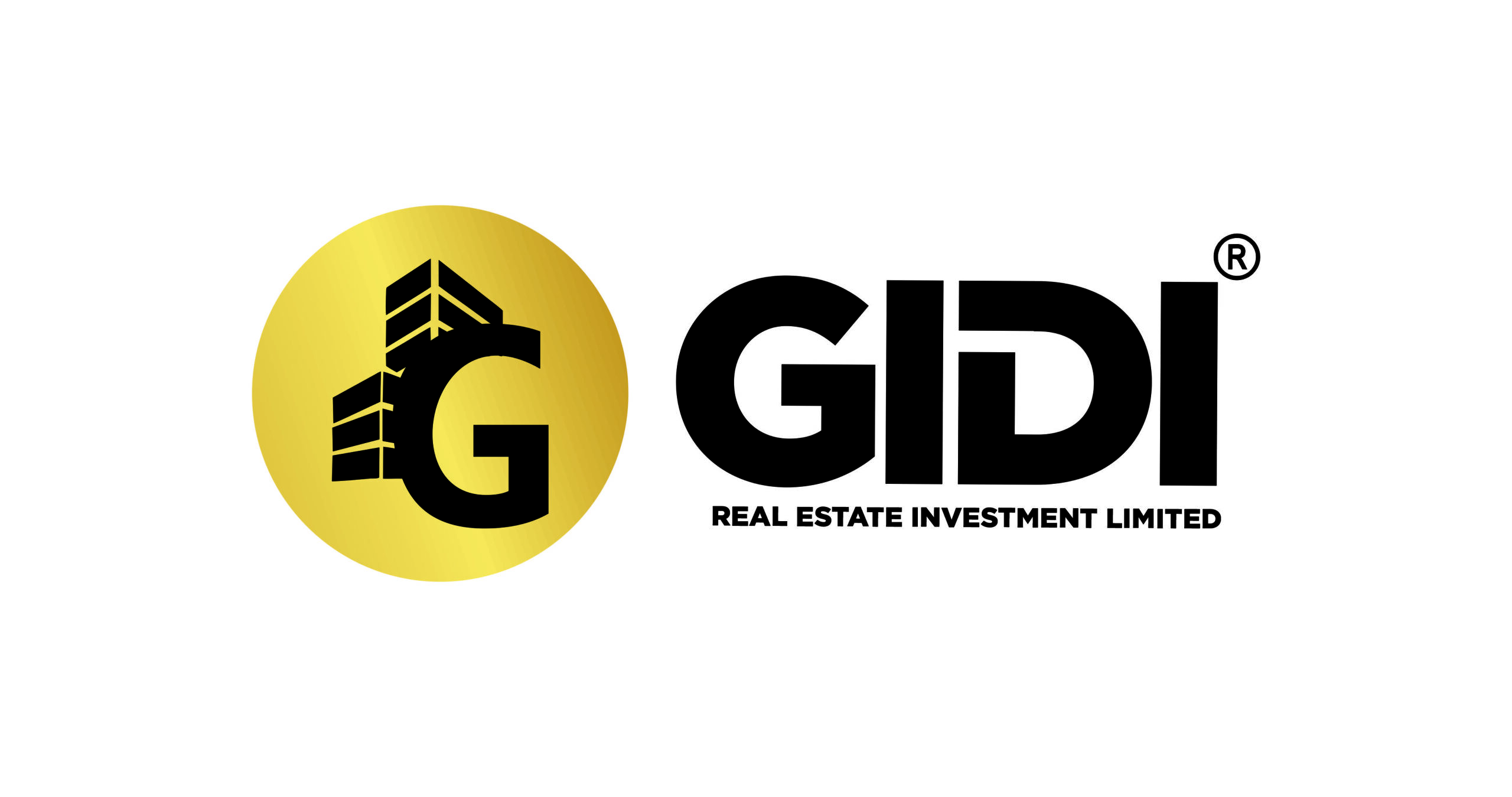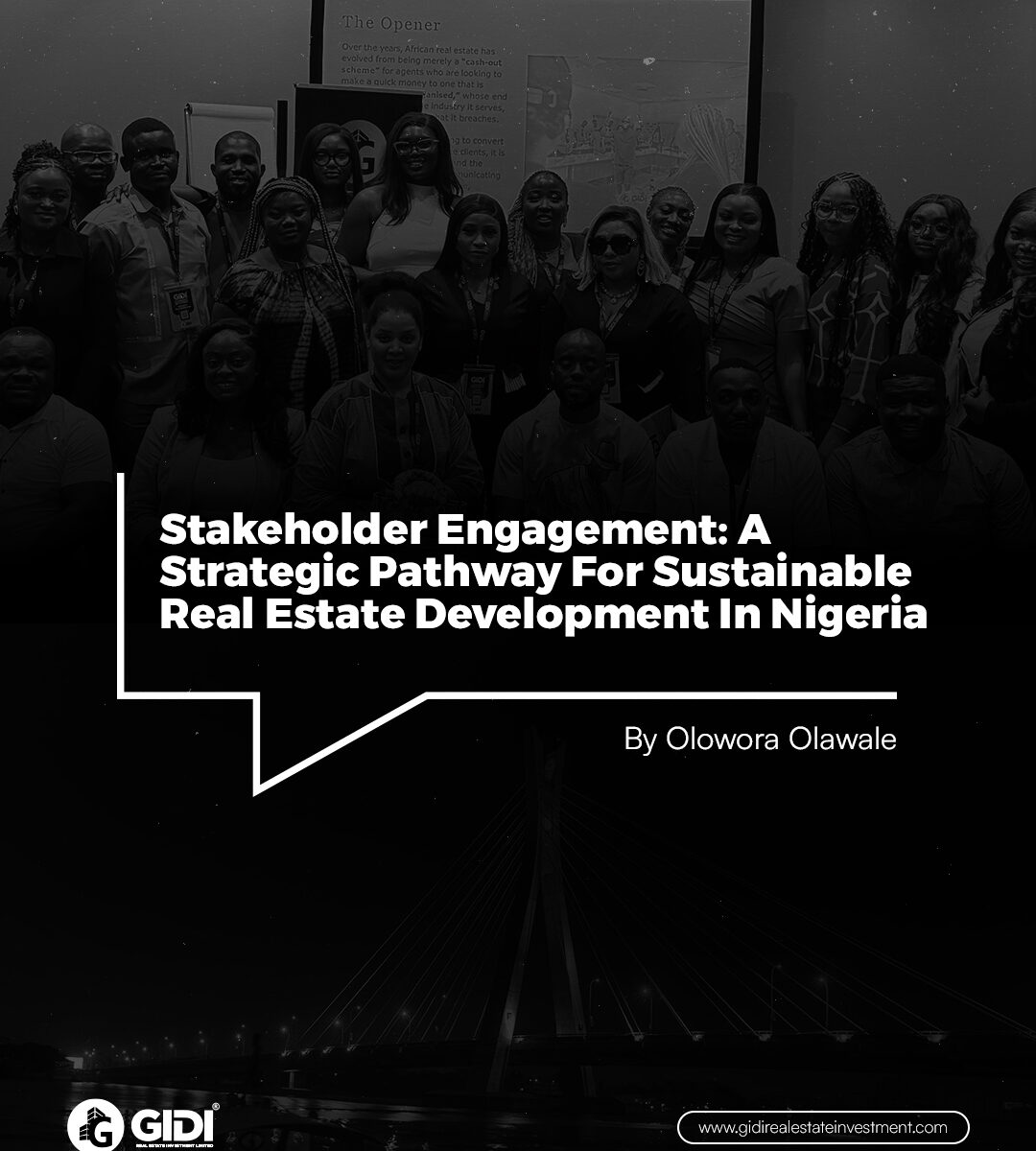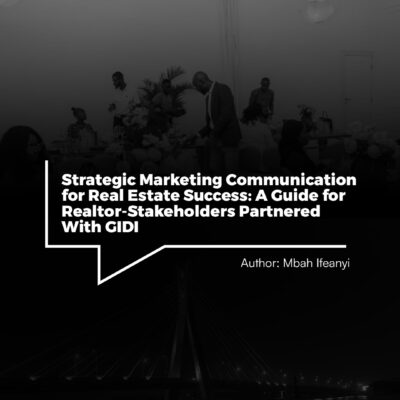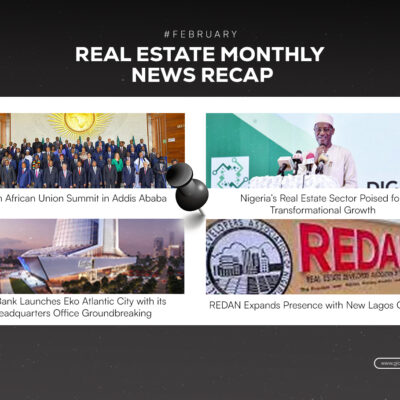The real estate sector in Nigeria, like in many emerging economies, operates within a complex ecosystem of interdependent stakeholders–government agencies, financial institutions, developers, investors, landowners, community leaders, and regulatory bodies. Unlike standalone industries where operational autonomy is possible, real estate development cannot exist in isolation. Every project, from conceptualization to completion, intersects with multiple stakeholder interests, each influencing project success, sustainability, and long-term economic impact.
Despite its importance, stakeholder engagement remains one of the most overlooked aspects of real estate development in Nigeria. This neglect often manifests in policy misalignments, land disputes, project delays, regulatory bottlenecks, and community resistance. As the sector struggles with housing deficits, infrastructural limitations, and inefficient urban planning, it becomes increasingly clear that a structured, transparent, and proactive stakeholder engagement framework is imperative.
This article explores the significance of stakeholder engagement in Nigeria’s real estate industry, its role in addressing industry challenges, key strategies for effective engagement, and the broader impact on policy development, urban growth, and sustainable housing solutions.
Stakeholder engagement is a strategic necessity for long-term real estate success. When properly executed, it ensures that the interests, concerns, and expectations of all involved parties are incorporated into decision-making processes, leading to more inclusive, efficient, and sustainable development outcomes.
In Nigeria’s rapidly evolving real estate market, stakeholder engagement serves several critical functions:
1. Bridging the Gap Between Developers and Policymakers
One of the major challenges confronting Nigeria’s real estate sector is policy inconsistency and regulatory complexity. Developers often face hurdles related to land acquisition, building permits, property rights enforcement, and compliance with urban planning laws. Many of these challenges arise due to a lack of synergy between real estate firms and government agencies.
Stakeholder engagement provides a structured avenue for dialogue, ensuring that real estate companies are not only compliant with existing regulations but also have a voice in shaping future policies that govern the industry. By fostering relationships with regulatory bodies such as the Federal Housing Authority (FHA), Lagos State Real Estate Regulatory Authority (LASRERA), and Urban Development Ministries, real estate developers can advocate for policy reforms that facilitate ease of doing business, promote investment incentives, and streamline approval processes.
2. Aligning Corporate Goals with Community Development
Land disputes remain one of the biggest sources of conflict in the Nigerian real estate sector. Many development projects have been stalled due to disagreements between real estate firms and host communities, leading to legal battles, financial losses, and reputational damage.
Proactive stakeholder engagement ensures that real estate companies factor in the needs and concerns of host communities from the outset. This includes:
-Conducting comprehensive community impact assessments before breaking ground on projects.
-Holding town hall meetings with local leaders, landowners, and representatives to foster transparency.
-Integrating Corporate Social Responsibility (CSR) initiatives such as infrastructure upgrades, employment opportunities, and community-driven projects to ensure mutual benefits.
Engaging communities from the planning stage reduces resistance, fosters trust, and ensures smoother project execution.
3. Strengthening Investor Confidence and Financial Backing
Investors play a pivotal role in real estate development, providing the capital necessary to drive large-scale projects. However, inconsistent regulatory policies, high transaction costs, and market volatility often deter investors from committing funds to Nigerian real estate ventures.
A structured stakeholder engagement model assures investors that projects are financially viable, legally compliant, and socially accepted. Developers can instill confidence in both local and foreign investors, ultimately attracting more capital inflows into the sector, by actively communicating risk mitigation strategies, regulatory compliance efforts, and project transparency, developers.
4. Enhancing Transparency, Accountability, and Compliance
Corruption, regulatory inefficiencies, and non-compliance with urban development laws have long plagued the Nigerian real estate sector. Many projects proceed without proper permits, environmental impact assessments, or stakeholder consultations, leading to litigation, demolitions, and financial losses.
A well-structured stakeholder engagement framework ensures:
-Clear communication of project plans, timelines, and compliance measures.
-Regular public disclosures and updates to investors, regulators, and community representatives.
-Adherence to global best practices in ethical business conduct.
By embedding transparency into real estate operations, companies not only mitigate legal and reputational risks but also build long-term industry credibility.
Key Strategies for Effective Stakeholder Engagement in Real Estate Development
To reap the full benefits of stakeholder engagement, real estate firms must adopt a proactive, structured, and multi-channel approach. The following strategies provide a blueprint for successful engagement:
1. Stakeholder Mapping and Categorization
A one-size-fits-all approach does not work in stakeholder management. Developers must identify, segment, and prioritize stakeholders based on their influence, interests, and concerns. Common stakeholder categories in real estate include:
-Regulatory Bodies– Government agencies overseeing permits, land use, and property taxation.
-Financial Institutions– Banks, mortgage firms, and private investors funding real estate projects.
-Host Communities & Landowners– Individuals and groups impacted by development projects.
-Real Estate Professionals– Brokers, consultants, surveyors, and urban planners involved in project execution.
-End Users & Homebuyers– The target market whose housing needs must be met.
By mapping out stakeholders, developers can tailor communication strategies, engagement methods, and collaboration models for each group.
2. Multi-Channel Communication and Engagement
Developers must leverage **both digital and traditional communication channels to engage stakeholders effectively.
Corporate Websites & Social Media Platforms – Providing real-time updates and responding to inquiries.
Public Relations & Media Campaigns – Establishing credibility through press releases and industry reports.
Community Consultations & Town Hall Meetings – Encouraging direct dialogue with local stakeholders.
Stakeholder Forums & Industry Conferences – Creating platforms for policy discussions and knowledge-sharing.
3. Collaborative Problem-Solving and Conflict Resolution
Rather than engaging stakeholders only when conflicts arise, developers should proactively involve them in the decision-making process. Setting up advisory panels, partnership models, and dispute resolution committees ensures that issues are addressed before they escalate into legal disputes or project delays.
4. Monitoring and Continuous Improvement
Stakeholder engagement is not a one-time initiative but an ongoing process. Developers should establish:
-Regular stakeholder satisfaction surveys to gauge the effectiveness of engagement efforts.
-Impact assessments to measure how engagement influences project success and policy alignment.
-Continuous feedback loops to refine strategies based on real-world outcomes.
As Nigeria’s real estate sector continues to grow, the role of stakeholder engagement cannot be overstated. Sustainable development hinges on transparent, inclusive, and strategic interactions with all involved parties. Real estate firms that embrace structured engagement frameworks will not only navigate regulatory complexities and mitigate investment risks but also foster industry-wide trust, drive policy reforms, and contribute to the long-term economic growth of Nigeria. Stakeholder engagement is not an option—it is a necessity for the future of real estate development in Nigeria.
Authors:
Olowoora Olawale,
Communications and Brand Manager, GIDI Real Estate Investment Limited






